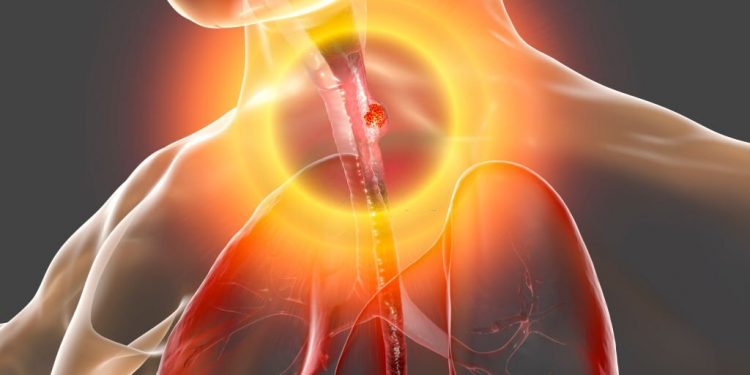Dysphagia can be divided into two main categories: esophageal dysphagia and oropharyngeal dysphagia. The former occurs when food gets stuck in the throat or chest after swallowing. The latter, which we will focus on, is difficulty in swallowing food or liquid that occurs between the mouth and esophagus. Food may go up the nose or enter the trachea (windpipe). Trying to swallow may induce coughing, gagging, or choking.
The four disorders most commonly responsible for oropharyngeal dysphagia are cancer, Zenker’s diverticulum, neurological disorders, and neurological damage. Below we discuss these conditions in relation to dysphagia.
Cancer
Some types of cancer may be responsible for an individual developing dysphagia. When the cancer is located in the esophagus, throat, or mouth, it can be the direct cause of not being able to swallow. Any head or neck tumor that narrows the passage for food ingestion may be to blame. These cancers may affect structures of the body that are needed for chewing and swallowing, such as throat muscles, lips, or tongue. Surgery for cancers in these areas may remove tissue that is needed for effective swallowing.
Chemotherapy may cause temporary dysphagia. It also reduces appetite which may lead to malnutrition. Chemotherapy can also worsen the effects of radiation. Radiation can cause stricture over a period of time. Effects may occur even years after radiation therapy took place. This is due to the fibrosis and scarring that occur from this treatment. This is also why medical personnel such as radiation therapists wear a lead apron to to protect themselves from the negative effects of radiation.
Zenker’s Diverticulum (Pharyngoesophageal Diverticulum)
Zenker’s diverticulum is when a pouch forms in the hypopharynx, specifically in the area between the inferior pharyngeal constrictor muscle and the cricopharyngeus. It may also develop in nearby regions like the Laimer triangle and the Killian-Jamieson area.
Food particles are trapped in the diverticulum. Symptoms include bad breath, dysphagia, and constant coughing or clearing of the throat. Surgery or endoscopy is usually required.
Neurological Disorders
Neurological disorders like traumatic brain injury, Parkinson’s disease, myotonic dystrophy, muscular dystrophy, cerebral palsy, and multiple sclerosis may result in dysphagia.
In milder cases, a speech and language therapist uses various strategies and exercises to improve swallowing ability. More moderate cases may require that food is pureed and that liquids are thickened by products such as those made by Simply Thick LLC to ensure nourishment and prevent dehydration. Severe cases result in the patient being fitted with a feeding tube. Dysphagia will be one of many symptoms requiring attention in extreme disorders.
Neurological Damage
The number one cause of oropharyngeal dysphagia is a stroke (65% of acute cases). Damage may also be due to injuries affecting the spinal cord and brain. Dysphagia due to neurological damage affects from four to eight hundred thousand persons globally every year.
Treatment focuses on restoring function through various compensatory methods, such as effortful swallowing or tilting the head forward then backward at the appropriate swallowing stage, and taught exercises to strengthen muscles. Adaptation methods include thickening liquids and pureeing food.
Dysphagia is a serious condition. Choking can lead to death without prompt intervention. Food can enter the lungs instead of the stomach, causing aspiration pneumonia. If the patient cannot get in enough liquid, they are prone to dehydration, which can have a rapid onset. Malnutrition from not ingesting adequate healthy food may follow.



